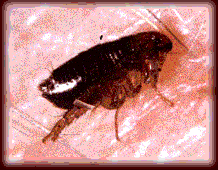

Fleas are parasitic wingless insects. In the course of their
life cycle, they metamorphosize from maggots, which feed on organic matter, into
adults, which feed on the blood of birds and mammals. They are responsible for
some of the most devastating diseases ever spread, including Bubonic Plague.
Bubonic Plague is caused by the bacterium Yersinia Pestis. It is transmitted to
humans by infected rats and by the infected fleas that live on infected rats.
Yersinia Pestis prevents fleas from effectively feeding by blocking their
stomachs, thus forcing them to regurgitate fresh blood back into the circulatory
system of their host. This contaminates the host with the bacteria, causing
elevated temperature, vomiting, muscular pain, and delirium. The host's lymph
nodes then fill up with bacteria-rich pus, giving rise to large, discolored
lumps. Without modern medical treatment, death ensues in several days. The
infamous Black Death was an outbreak of Bubonic Plague in Europe during the early
1330's. It killed as many as 25 million people, or 1/3 of Europe's total
population, within five years.
Fleas also help to spread nonepidemic typhus (known as murine typhus), tularemia,
and salmonellosis.
